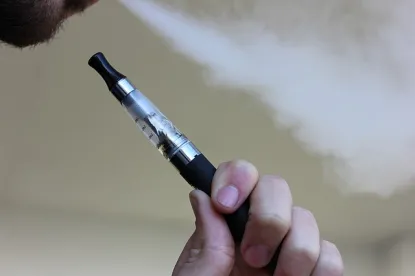In yet another example of U.S. states and localities filling the empty shoes of the FDA, Michigan has banned all e-cigarette flavors within its borders. Gretchen Whitmer, Governor of Michigan, made a public statement as follows, “My number one priority is keeping our kids safe. Right now, companies selling vaping products are using candy flavors to hook children on nicotine and misleading claims to promote the belief that these products are safe. That ends today.”
The ban, scheduled to go into effect within thirty days of signing, has an aggressive implementation period that has curried favor with the Michigan Attorney General, and Michigan consumers. Michigan earlier issued a ban on sales to minors, and has joined several states and municipalities in implementing e-cigarette regulation to fill the consumer protection gap left by the “absent” FDA. (See San Francisco ban on sales of e-cigarettes.)
The vaping industry, unsurprisingly, was outraged by Governor Whitmer’s announcement.
According to vaping.org, Gregory Conley, the President of the American Vaping Association, responded with the following statement containing an unproven claim that e-cigarettes are “harm reduction products:”
“This shameless attempt at backdoor prohibition will close down several hundred Michigan small businesses and could send tens of thousands of ex-smokers back to deadly combustible cigarettes. These businesses and their customers will not go down without a fight. We look forward to supporting the lawsuits that now appear necessary to protect the right of adults to access these harm reduction products.”
Conley’s unproven, “harm reduction” claim is pervasive in the vape industry, just as “light cigarettes” were falsely touted as safe alternatives in the tobacco industry.
JUUL, arguably the most successful vape company, was just issued an FDA letter telling it to stop falsely claiming its product is a safe alternative to smoking. It is not a proven claim and can’t be used in advertising. In fact, there is a growing body of knowledge that vaping is harmful to users.
Either Conley doesn’t know this, or he doesn’t care. In either event, he is unlikely to stop making those claims until the FDA does more to curtail the e-cigarette industry’s penchant for copying Big Tobacco.
Conley also stated that adults want flavoring in e-cigarette products. Yes, it seems possible they do, as did adults using tobacco products. Nevertheless, cigarette flavors were finally banned in 2009 to protect children and adults from the dangers of smoking. With that knowledge it’s hard to fathom why Conley thinks the ban will force vapers back to cigarettes to get flavor—there are no flavors (other than menthol). That weird comment makes it look like his statement is just another in a long line of inflammatory PR ploys.
The FDA, which has authority to regulate e-cigarettes, backed away from proper regulation back in 2016. Now, three short years later, the FDA will need to do more than issue compliance letters to JUUL if it wants the Big Vape industry to stop misrepresenting e-cigarettes. “Safe alternative to cigarette smoking” has become a mantra in the industry—even to the point of telling school-age children that e-cigarettes are safe.
Meanwhile, and quite rightly, frustrated states and municipalities have decided they can’t afford to wait for FDA regulation of the out-of-control industry. They have, and will continue to, implement their own regulations until the FDA steps up to protect consumers nationwide.



 />i
/>i
